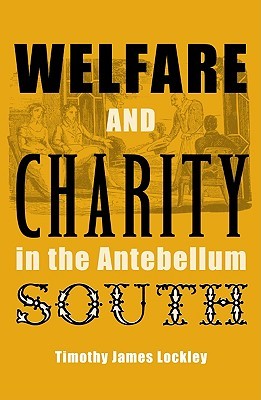
- We will send in 10–14 business days.
- Author: Timothy James Lockley
- Publisher: University Press of Florida
- ISBN-10: 0813034469
- ISBN-13: 9780813034461
- Format: 15.2 x 22.9 x 1.7 cm, softcover
- Language: English
- SAVE -10% with code: EXTRA
Welfare and Charity in the Antebellum South (e-book) (used book) | bookbook.eu
Reviews
Description
"A comprehensive and challenging assessment of southern charitable practices. Viewing poor relief in terms of what the agencies did, Lockley downplays theory-laden approaches that focus exclusively on what laws and elites said."--T. Stephen Whitman, Mt. St. Mary's University
Public welfare in the United States has existed in one form or another since the colonial period. Most historical investigations into the practice tend to focus on urban settings, mostly in the North. Welfare and Charity in the Antebellum South offers a much-needed counterpoint, revealing both the breadth of how southerner elites helped their poor, even in rural areas, and the racial impetus behind their actions.
In the nineteenth century, private benevolence was almost exclusively for whites. Public welfare in the South was disproportionately targeted at poor whites, and included the founding of state-supported schools, orphan and health care, and efforts to ameliorate starvation. As a result, poor whites' resentment of the rich was diminished, and they were, as a group, more willing to cast their lot with slaveholders as the Civil War loomed large.
This work ranges over the entire South and makes important comparisons between the upper and lower South, between urban and rural areas, and between welfare efforts in the South and in the North, where charity typically--and incorrectly--has been seen as more widespread.
EXTRA 10 % discount with code: EXTRA
The promotion ends in 18d.04:18:52
The discount code is valid when purchasing from 10 €. Discounts do not stack.
- Author: Timothy James Lockley
- Publisher: University Press of Florida
- ISBN-10: 0813034469
- ISBN-13: 9780813034461
- Format: 15.2 x 22.9 x 1.7 cm, softcover
- Language: English English
"A comprehensive and challenging assessment of southern charitable practices. Viewing poor relief in terms of what the agencies did, Lockley downplays theory-laden approaches that focus exclusively on what laws and elites said."--T. Stephen Whitman, Mt. St. Mary's University
Public welfare in the United States has existed in one form or another since the colonial period. Most historical investigations into the practice tend to focus on urban settings, mostly in the North. Welfare and Charity in the Antebellum South offers a much-needed counterpoint, revealing both the breadth of how southerner elites helped their poor, even in rural areas, and the racial impetus behind their actions.
In the nineteenth century, private benevolence was almost exclusively for whites. Public welfare in the South was disproportionately targeted at poor whites, and included the founding of state-supported schools, orphan and health care, and efforts to ameliorate starvation. As a result, poor whites' resentment of the rich was diminished, and they were, as a group, more willing to cast their lot with slaveholders as the Civil War loomed large.
This work ranges over the entire South and makes important comparisons between the upper and lower South, between urban and rural areas, and between welfare efforts in the South and in the North, where charity typically--and incorrectly--has been seen as more widespread.


Reviews